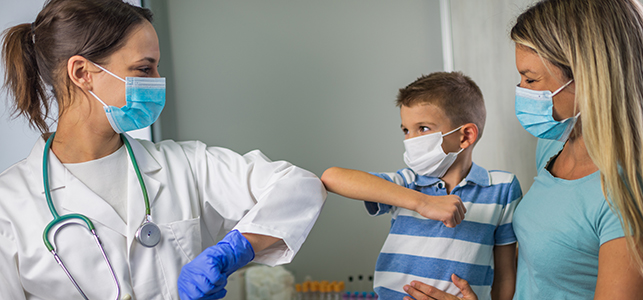
The much-anticipated day has arrived and kids ages 5-11 now have their turn to get the COVID vaccine. Dr. Suzanne Lavoie, infectious diseases specialist, answers some of the most common questions parents have about the vaccine for children.
Kids have been getting sick from COVID-19, with some requiring hospitalization. The vaccine is the best way to prevent severe illness. It’s also critical in helping to stop the spread of the virus and prevent new variants from emerging. Delta has been the most contagious yet and we need to do everything in our power to keep the virus from mutating to new, even more dangerous variants.
As more children get vaccinated, they’ll be able to safely stay in school, childcare and the extracurricular activities they enjoy.
The development of safe, effective COVID-19 vaccines has been a top priority for researchers and built upon significant prior experience working with other coronaviruses. This vaccine, like all vaccines, has gone through a rigorous series of trials to earn its emergency use authorization from the U.S. Food and Drug Administration. EUAs are granted for specific age groups only once the vaccines have proved to be safe and effective for them.
Read more about the clinical trials and vaccine safety for kids 5-11.
No. Kids will be given two doses of the vaccine, 21 days apart. Each dose is 10 micrograms, which is smaller than the 30-microgram doses given to people 12 and older.
This smaller dose was determined to provide the best balance between safety and immunogenicity – or ability to cause a protective immune response – in children in this age group. During the clinical trials, kids’ immune responses to these doses were comparable to the responses seen in people ages 12 and older with the larger doses.
Pfizer reported that the side effects seen in the trials were similar to those seen in the 12-15 age group – sore arm, muscle aches, fatigue, headache, chills or fever lasting only a day or two. Mild responses like these are a sign that the body is responding to the vaccine and building protection, which is exactly what we want it to do.
While there have been reports of myocarditis (inflammation of the heart muscle) following COVID vaccinations in the older age groups, it’s important to note a few things:
There is no peer-reviewed evidence that the COVID vaccine – or any vaccine – affects fertility. The COVID vaccine triggers a response in the immune system but doesn’t interact with the body’s DNA or have any hormonal properties that would cause it to impact fertility.
The Centers for Disease Control and Prevention says it’s safe to get the COVID vaccines at the same time as other immunizations, including the flu shot. Data from other vaccines show that the way our bodies develop protection is similar whether vaccines are given alone or with other vaccines. Side effects are similar too.
If you’d prefer to stagger your child’s COVID and other vaccines, that’s okay! The most important thing is that they get them in a timely manner.
Yes. There will be some natural immunity from having COVID, but it doesn’t last forever. The CDC recommends vaccination for people who have had and recovered from COVID-19 in the past as an extra layer to protect from getting it again, and potentially more severely than before.
COVID vaccines are available at no cost at health care providers and pharmacies throughout the community. The best approach is to check with your child’s pediatrician or primary care provider for information about availability. If your child is a CHoR patient, give us a call at (804) 828-CHOR (2467) to schedule a vaccine appointment.
Studies continue on kids ages 6 months to 5 years, with doses of 3 micrograms for each injection in this age group. We don’t know exactly when data will be submitted to the FDA for approval but will be keeping a close eye on it.
If you have specific questions about your child’s health and the COVID vaccine, talk with their pediatrician or primary care provider. They’re equipped to help you make the decisions that are best for your family.